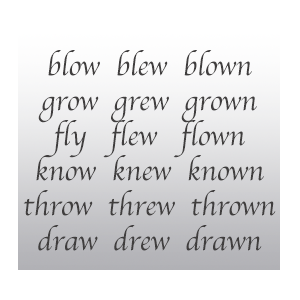 Every second English learner has some issues with irregular verbs. Many people simply hate those long tables with irregular verbs that all the schoolchildren used to parrot during English lessons. However, a lot of irregular verbs belong to frequent vocabulary and are just as important as bricks and mortar for a house.
Every second English learner has some issues with irregular verbs. Many people simply hate those long tables with irregular verbs that all the schoolchildren used to parrot during English lessons. However, a lot of irregular verbs belong to frequent vocabulary and are just as important as bricks and mortar for a house.
A good news is that you don’t need to learn all the 470 irregular verbs, only 180 verbs are used frequently. On the downside, you can’t have a clear rule for every irregular verb because they came from Old English and were formed chaotically. As Steven Pinker wrote in his article, “Every time we use an irregular verb, we are continuing a game of Broken Telephone that has gone on for more than five thousand years”.
As people need to memorise irregular verbs anyway, you can benefit from some strategies how to make this process effective, simple and enjoyable.
1) Always learn irregular verbs with translation
One of my students, a schoolboy, proudly told me that he had learnt twenty new English irregular verbs from my list. When I asked him to pronounce three forms of the verb “to build”, saying the verb itself in Russian, the task took him by surprise. He said thoughtfully, “You know, our teacher always pronounced a verb in English and we spoke out the forms. I don’t know how to translate this word into English”.
That was simply unbelievable for me! The boy learnt twenty verbs and didn’t know what they meant! What’s the reason for such study? I smiled and explained to him that, first of all, he needed to understand very well the meaning of each verb and only then memorise the forms. That way he would be able to use irregular verbs in his speech and writing.
To test the students’ knowledge, I often give them verbs in Russian, and they pronounce all the three forms. Next, I think of a couple of sentences to translate, using different tenses to make sure that they can use the forms they learnt.
2) Group verbs by patterns
Although irregular verbs are unpredictable, you can still find some patterns, e.g. blow-blew-blown, grow-grew-grown, flow-flew-flown or another series: cut-cut-cut, set-set-set, put-put-put.
In most grammar textbooks, irregular verbs are grouped alphabetically. Personally, I believe that this order makes no sense because you will never use irregular verbs in alphabetic order in real life. Therefore, I compiled another list of irregular verbs, grouped by patterns. Some verbs still do not fall into any group and should be memorised separately, for instance, do-did-done or hear-heard-heard.
There are about 80 irregular verbs in my short list of the most frequent verbs, that will be perfectly enough for the beginning. If you study 10 verbs from this list every day, it will take you only 8 days to learn the whole list. Later, you can add another hundred of irregular verbs gradually.
3) Practice to create stories with “I”
That’s a very powerful strategy to activate irregular verbs. Your story should not be realistic at all. On the contrary, the more phantasy you use, the better your mind will remember the verbs because you will use the right hemisphere of your brain (responsible for creativity). You can start your story like a fairy tale, e.g. “Once upon a time I went to the forest. I bought a bottle of water and brought a couple of sandwiches to have a picnic. Suddenly I saw a wolf and fought with it for three hours. Then I got hungry and thought of lunch….”
4) Spot irregular verbs while reading
As you read articles or books, you can spot different less common irregular verbs. Make a mental note and add them to some existing groups. This way you will acquire new irregular verbs naturally and won’t need to parrot them like the list of 80 most frequent irregular verbs.
5) Play games
This is by far the most enjoyable strategy both for kids and adults. You can create a deck of cards with the translation of an irregular verb on one side and its three forms on the other side. Afterwards, you can invite one or two more players, put the deck on the table so that you could see only the translation and take the cards one by one. The player who says the forms correctly, gets the card.
Later, you can use a more complicated technique – when you see the card, you need to create a sentence beginning with “Yesterday I…“. Then you need to check, if you used the correct form of the verb.
Another funny game is English attack. In this game, one dog is chasing another one, and you have limited time to type the correct form of some irregular verb. If you manage to type it correctly, you save the dog, if not, your dog loses the race.
Usually, one week is enough to master the list of 80 most frequent verbs, and two more weeks to add another hundred. If you do it by stories, reading and games the learning process will be a piece of cake.
 Русский
Русский English
English



